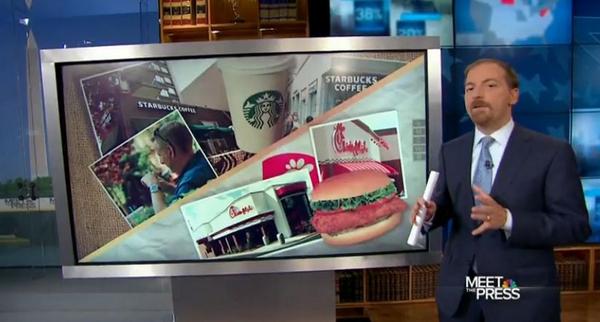
Chuck Todd explains his theory about Chick-fil-A and Starbucks instead of talking about climate change.
Not talking about the largest climate march in history (Action Alert, 9/22/14) left Chuck Todd with some time to fill up on NBC‘s Meet the Press. Some of it he spent explaining his theory that the 2014 midterms are really a battle between Chick-fil-A and Starbucks. (Republicans like the chicken franchise, apparently, whereas Democrats prefer the coffee chain.)
But Todd also had some questions about Libya policy for UN Ambassador Samantha Power. They’re worth quoting, because they typify a worldview that underlies a lot of our foreign policy debates:
There’s a big headline in the Washington Post this morning about basically more chaos in Libya, some assassins in Benghazi, the back and forth that’s been going back there, the fight to sort of control Libya. What’s the lesson learned on the United States intervention in Libya in hindsight now for you, when you are applying to, sort of, how we’re dealing in Syria?
We left a vacuum in Libya and now there’s chaos in Libya. How do you prevent that from happening in Syria once the US is successful in getting rid of ISIS? The goal of getting rid of Gadhafi, you did it. Then there was a chaotic vacuum. You’re going to get rid of ISIS in Syria; how do you prevent a similar chaotic vacuum?
Note the presumption that the US will be able to wave a magic wand and eliminate the Islamic State in Iraq and Syria (ISIS): “You’re going to get rid of ISIS in Syria,” Todd flat out says; it’s a matter of “once the US is successful” rather than “if.” Never mind that the US has not eliminated the Taliban in Afghanistan after 12 years of war with as many as 100,000 troops on the ground, to cite just one example of the US military’s lack of omnipotence; in the case of ISIS, a few rounds of bombing are going to do the trick.
The only problem that Todd foresees is that we left a “vacuum” in Libya, and we might leave a similar “chaotic vacuum” in Syria. It’s not the presence of violent movements that Washington trained, or that sprang up in reaction to US violence, and the weapons that these countries were flooded with as part of US strategy that are the problem–oh no. The problem, as defined by US pundits, is always a lack of intervention–“we” won’t be there enough, and without enough us, who knows what will happen?